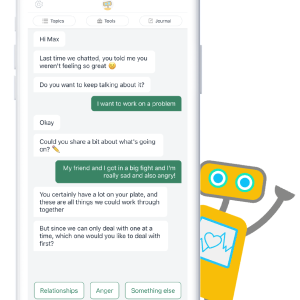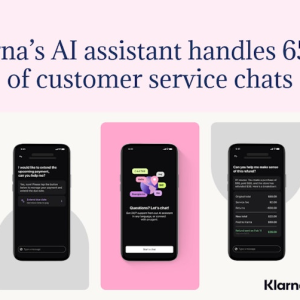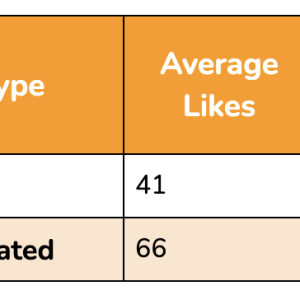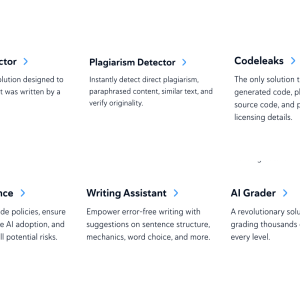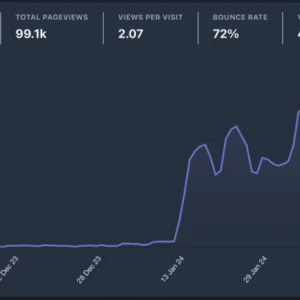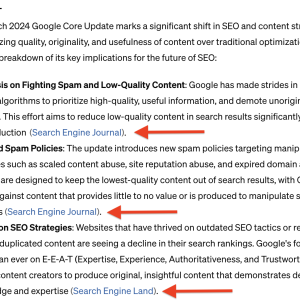In today’s fast-paced legal industry, staying ahead of the competition and effectively managing caseloads is crucial for success. As the demand for legal services continues to grow, many lawyers are turning to artificial intelligence tools to streamline their workflows and improve their overall effectiveness. One such tool, ChatGPT, offers a unique solution for lawyers looking to enhance their productivity and provide better services to their clients. By leveraging the power of AI technology, ChatGPT can assist lawyers in drafting legal documents, conducting legal research, and managing client communications more efficiently. In this article, we will explore how ChatGPT can help lawyers improve their effectiveness and achieve better outcomes for their cases.
- How to Optimize for AI Like ChatGPT: 7 Tips To Get the Best Results
- The Biggest Issues with Artificial Intelligence in Marketing Content
- Should You Leverage AI in Marketing Instead of Hiring Marketers?
- Reasons Why AI Is Overrated for Marketers in 2023
- The Rise of Therapy Bots: How AI Is Transforming Mental Health Support
Welcome to our article on ChatGPT for lawyers. In the legal industry, the pen is mightier than the sword — but what if you could wield both with unparalleled precision and speed?
You are viewing: ChatGPT for Lawyers: How Can This AI Tool Help Improve Your Effectiveness?
Enter ChatGPT, a generative AI language model developed by OpenAI, which can understand and respond to human language.
With a single prompt in ChatGPT, you can respond to questions, draft full emails, or create complex code, and it has burst onto the scene as a game-changer for professions across the spectrum.
Lawyers and law firms at the forefront of AI technology adoption are discovering this tool’s incredible potential to streamline their work, enhance productivity, and even deliver more nuanced legal insights.
This blog post will guide you through the practical applications of using ChatGPT for lawyers, paralegals, and law clerks, along with natural language prompts to use this technology to help with many practice areas.
ChatGPT for Lawyers: Use Cases and Prompts
Discover how ChatGPT can use AI natural language processing technology to revolutionize how many lawyers work, from the drafting stage to the final communication with stakeholders.
The ability to ask ChatGPT follow-up questions and receive more detailed responses from subsequent prompts truly transforms the traditional “Google it” method.
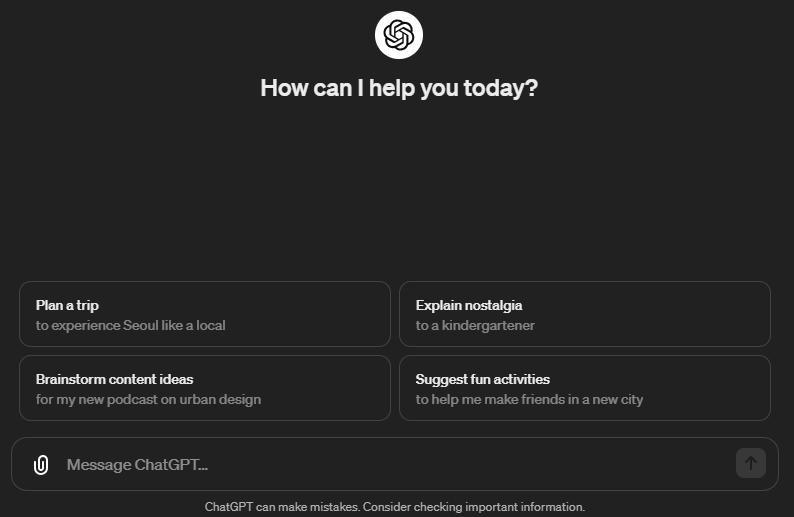
Simplify Contract Creation
Contract drafting is a meticulous, time-consuming process that requires an attention to detail that borders on the obsessive.
With ChatGPT, lawyers no longer face the blank page alone when drafting legal documents; they can now collaborate with an AI assistant that can create boilerplate text, suggest legal clauses, and even compose your first draft.
ChatGPT Prompts to Help With Drafting Contracts
Summarize Key Clauses
“Provide a summary of the essential clauses for a commercial lease agreement, focusing on rent terms, lease duration, and termination rights.”
This example prompt helps a lawyer quickly identify crucial components of contracts with the help of AI, ensuring that all significant terms are covered without diving into lengthy documents.
Generate Clause Variations
“Create three variations of a confidentiality clause for a consulting agreement, varying in strictness and detail level.”
Law firms can use this to tailor contracts to specific needs, offering flexibility in legal drafting by having different options ready for different scenarios.
Contract Review Guidance
“List common pitfalls in software licensing agreements and suggest best practices for drafting to avoid them.”
This example prompt assists law firms in improving contract quality by learning from common mistakes, ensuring a smoother legal agreement process, and minimizing risks.

Automate Document Review
Reviewing lengthy documents for due diligence or discovery processes is essential yet incredibly arduous.
The ChatGPT AI chatbot can swiftly annotate, categorize, and highlight potential issues and important details, freeing up valuable lawyer time for more complex analysis and case strategy.
ChatGPT Prompts for Document Review and Analysis
Identify Key Issues
“Analyze this employment contract and highlight any clauses that could potentially lead to disputes or legal challenges.”
This prompt guides legal professionals to quickly pinpoint areas of concern within a document, streamlining the review process and helping prioritize areas for closer examination.
See more : 11 Best Languages for AI: How to Maximize Your Programming Know-How
Comparison Analysis
“Compare these two partnership agreements and outline the differences in their profit-sharing structures and dispute resolution mechanisms.”
Using this example prompt, lawyers can easily spot differences between similar legal documents with the help of AI, making it simpler to advise clients or prepare for negotiations with a clear understanding of varying terms.
Summarize Complex Documents
“Summarize the main obligations and rights established in this lease agreement, focusing on tenant responsibilities and landlord duties.”
This prompt is invaluable for lawyers who need to digest legal documents efficiently, enabling them to grasp valuable insights from extensive agreements without getting bogged down in details.
Check out other options to speed up your workflow in our article on document review software.

Speed Up Legal Research
In the realm of legal research and discovery, leveraging AI chatbots like ChatGPT can be a game-changer.
Lawyers can use this technology to navigate vast amounts of information, such as legal developments and relevant case law, swiftly and effectively to generate insights.
Here are three example prompts that can assist any legal professional in harnessing the large language model of ChatGPT AI to conduct legal research and discovery:
ChatGPT Prompts for Research and Discovery
Legal Precedents and Case Law Summary
“Summarize the key findings and legal principles from the latest cases on copyright infringement in the digital age.”
This prompt helps lawyers stay updated with current trends and rulings, allowing them to draw relevant parallels to their cases and reinforcing their arguments with contemporary judicial thought.
Statutory Interpretation and Analysis
“Explain the implications of the new data protection regulations for small businesses, highlighting compliance requirements and penalties for violations.”
Law firms can use this prompt to cut through complex legislative language to create clear insights into how new laws affect different entities and what steps are needed to ensure compliance.
Discovery Document Analysis
“Identify and list all instances of contractual breaches mentioned in these email chains and related documents provided during discovery.”
This prompt is crucial during the discovery phase, as it aids lawyers in pinpointing evidence within extensive documentation, saving time and resources in the process of building a strong case foundation.

Improve Communication with Stakeholders
Clear and effective communication is the linchpin of any successful law firm. Using ChatGPT can speed up crafting emails, preparing speeches, and even streamline communication with clients and other parties.
ChatGPT Prompts for Communication
Drafting Clear Emails
“Draft an email explaining the implications of a recent legal development to a non-legal audience, focusing on its impact on their business operations.”
This prompt helps lawyers convey complex legal information in an understandable manner, which is crucial for ensuring clients and stakeholders can make informed decisions based on accurate interpretations of the law.
Create Informative Presentations
See more : 7 Powerful AI Background Remover Tools That Help Make Designing a Breeze
“Generate a presentation outline for explaining the stages of a civil litigation process to clients, including key milestones and what to expect at each stage.”
Using this prompt, lawyers can prepare materials to answer questions about the legal process for their clients, helping to reduce anxiety and build confidence in the legal strategy being pursued.
Demand Letters for Breach of Contract
“Create a demand letter for a breach of contract that outlines the nature of the breach, its impact on my client, and a detailed explanation of the corrective action required. Emphasize the legal basis for the demand and include a specific timeline for remedying the breach.”
Using this example prompt, lawyers can specify the breach’s details and the expected remedies, making it clear what actions the other party must take to avoid further legal consequences.
Effective Meeting Summaries
“Compose a summary of key points discussed during a client meeting about a merger agreement, highlighting action items and next steps.”
This prompt is designed to improve post-meeting communications, ensuring all participants are on the same page and understand their responsibilities moving forward, streamlining the progress of legal matters with the help of AI.
Developing a Marketing and Client Intake Strategy
“Create a detailed plan for digital marketing efforts aimed at increasing awareness of our estate planning services among adults aged 40-60. Include strategies for social media content, targeted ads, and an optimized landing page designed to encourage online appointment bookings. Also, outline an automated client intake process that begins with the initial online contact, ensuring a smooth and efficient experience for potential clients.”
This prompt aims to create a detailed strategy that attracts the right audience with targeted marketing and smoothly turns interested prospects into active clients through an improved intake process.
Check out our list of law firm slogan ideas for more help with marketing.

Limitations of ChatGPT for Law Firms
While the potential ChatGPT offers the legal practice is vast, its capabilities should have boundaries regarding legal tasks.
There are potential risks that artificial intelligence can miss contextual cues or fail to interpret local or uncommon legal nuances. And machine learning algorithms lack the human touch that many legal cases require.
It also raises questions related to the ethical considerations of AI, such as maintaining client confidentiality and not crossing the line into unauthorized practice of law, which any law firm will need to consider.
It’s crucial to remember that ChatGPT, or any AI, is simply a tool in a lawyer’s arsenal.
When using ChatGPT to create, review, or summarize any documentation, a legal practice must approach it with the same critical eye used for any other legal research tool, ensuring any AI draft outputs are thoroughly vetted and supplemented with their own acumen.
Investing in training to use AI technology in legal work responsibly and effectively is paramount for early adopters.
Any law firm thinking of integrating generative AI tools into their workflow in the future should set clear guidelines on using ChatGPT, data management, and legal and ethical considerations of using this technology.

Final Thoughts on ChatGPT for Lawyers
As you can see, as the legal profession adapts to new technology, AI, like ChatGPT, will likely continue to become an integral part of the workflow for navigating the intricate and detail-rich legal field.
They’re not so much meant to disrupt tradition – but to enhance the capabilities of legal services.
Understanding these AI tools’ strengths and limitations allows legal professionals to use them responsibly and ethically, maximizing their benefits to save time processing complex tasks for any law firm.
Introducing ChatGPT to legal technology is a significant breakthrough, paving the way for a future where routine tasks in the legal industry are not only faster but also smarter and more effective with the help of AI.
It’s the perfect time for legal professionals to explore this innovation and revolutionize the practice of law.
Check out this article for more AI use cases for businesses.
That concludes the article: ChatGPT for Lawyers: How Can This AI Tool Help Improve Your Effectiveness?
I hope this article has provided you with valuable knowledge. If you find it useful, feel free to leave a comment and recommend our website!
Click here to read other interesting articles: AI
Source: wubeedu.com
#ChatGPT #Lawyers #Tool #Improve #Effectiveness
Source: https://wubeedu.com
Category: AI





